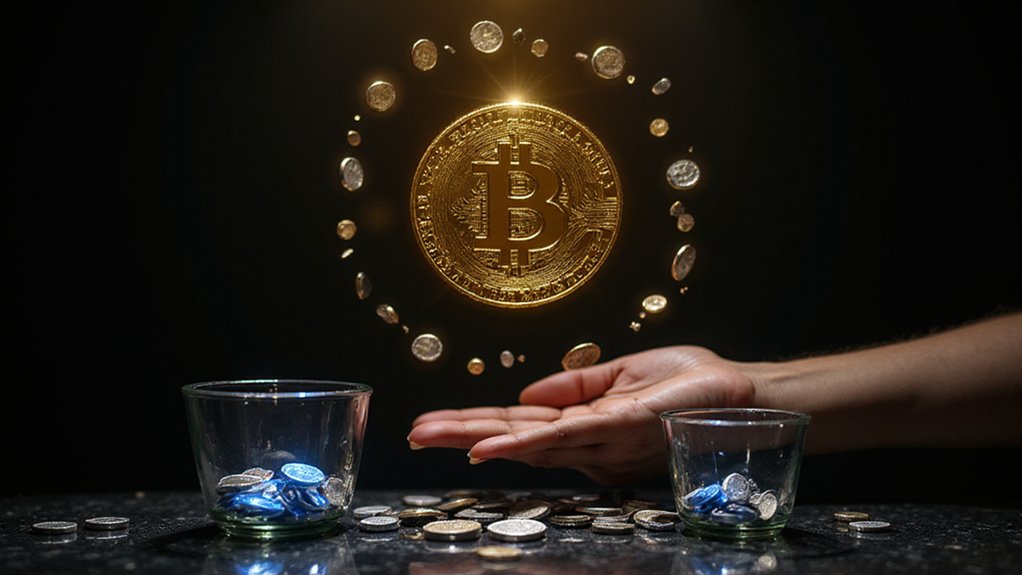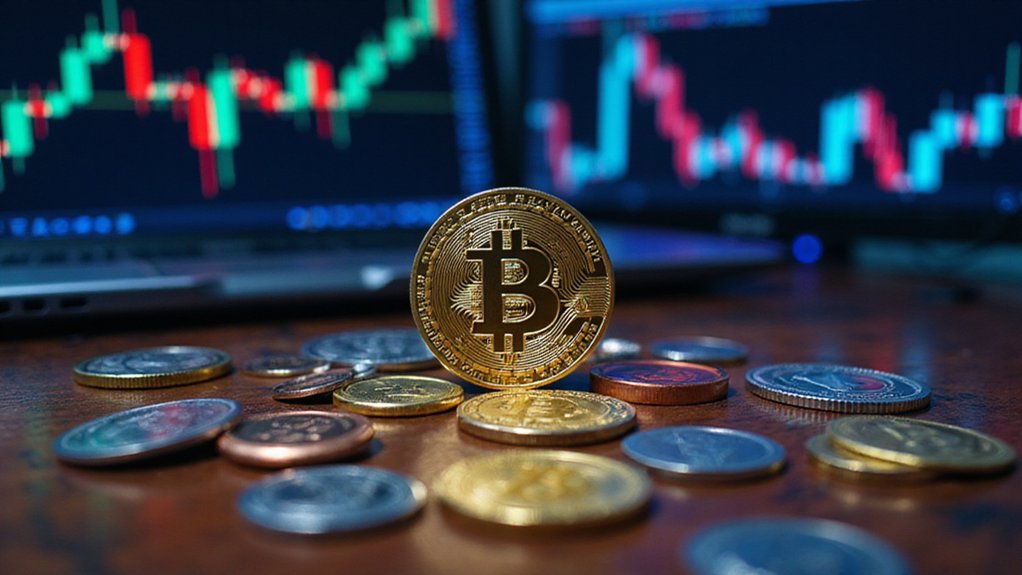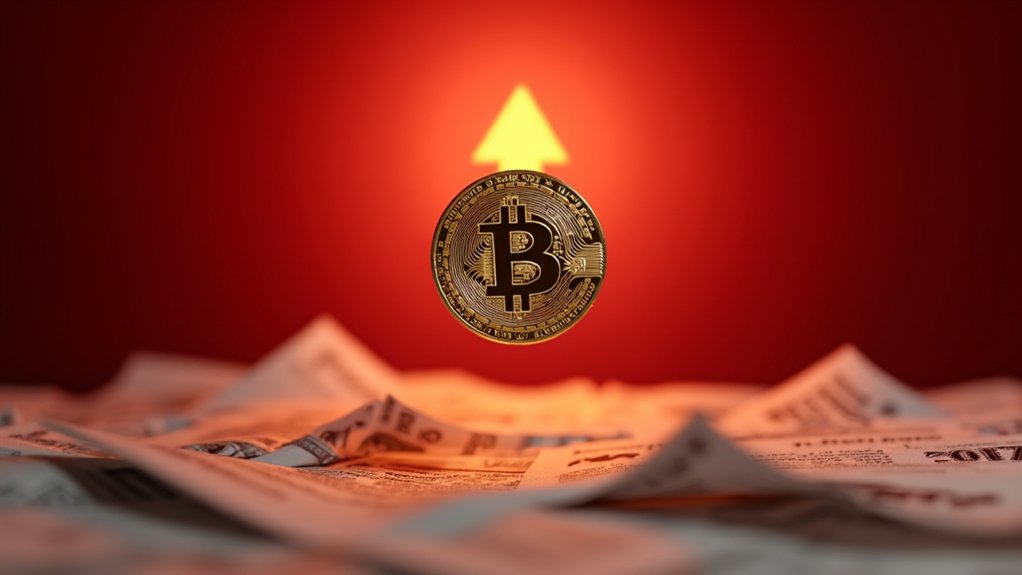Token voting transforms digital assets into political instruments, granting governance rights proportional to cryptocurrency ownership. Holders stake tokens to participate in decisions ranging from interface tweaks to fundamental protocol restructuring, with smart contracts automatically tallying results. While ostensibly democratizing control over billions in assets, the system often concentrates power among sophisticated operators and early investors—raising questions about whether this represents genuine decentralization or simply plutocracy with blockchain characteristics and novel technical complexities.

How does one democratize control over billions of dollars in digital assets without descending into the chaos that typically accompanies mob rule? Token voting systems represent the cryptocurrency sector‘s ambitious attempt to solve this governance paradox—though whether they succeed remains a matter of considerable debate.
Token voting grants governance rights proportional to ownership, transforming digital assets into political instruments. Each governance token typically equals one vote (though projects vary in their arithmetic), enabling holders to influence protocol upgrades, fee structures, treasury allocations, and leadership appointments. The mechanics are deceptively straightforward: token holders stake their assets, review proposals on governance portals, cast votes within predetermined windows, and watch smart contracts tally results with algorithmic precision.
The system’s apparent elegance masks underlying complexities. Participation requires more than mere ownership—holders must navigate staking requirements, connect compatible wallets, and often lock tokens for extended periods. Delegation mechanisms allow sophisticated operators to accumulate voting power from less engaged participants, creating unofficial hierarchies within supposedly egalitarian structures. Some protocols require quorum thresholds to validate outcomes, occasionally leading to the peculiar spectacle of valuable proposals failing due to voter apathy rather than opposition. Governance tokens represent perceived value in community influence, with limited supply enhancing their worth among users seeking decision-making power.
The elegant promise of democratic governance crumbles when sophisticated operators exploit voter apathy to concentrate power within supposedly decentralized systems.
Token voting encompasses decisions ranging from mundane interface modifications to fundamental protocol restructuring. Treasury management votes can redirect millions in development funds, while fee adjustment proposals directly impact user economics. The transparency is undeniable—every vote lives immutably on-chain—yet the democratic ideals often collide with the reality of concentrated token ownership among early investors and institutional players. Similar to how staking operates as a mechanism for blockchain security, token governance creates incentives for honest participation in network decision-making processes.
The purported advantages include reduced centralized control, enhanced community engagement, and alignment between governance participation and financial stake. Token voting theoretically incentivizes long-term commitment while enabling community-driven innovation. Governance tokens function across both on-chain governance through direct blockchain voting and off-chain discussions in community forums. However, the effectiveness depends heavily on implementation details: quorum requirements, voting windows, delegation frameworks, and proposal submission processes all influence outcomes.
Whether token voting represents genuine democratization or merely sophisticated plutocracy remains an open question. The blockchain faithfully records every decision, but recording consensus and achieving meaningful decentralization are entirely different propositions—a distinction that billions in digital assets continue to test daily.
Frequently Asked Questions
Can Token Holders Vote Anonymously in Crypto Governance Systems?
Token holders can achieve anonymity through sophisticated cryptographic mechanisms like zero-knowledge proofs and ring signatures, though implementation remains challenging.
While systems like ElectAnon and NounsDAO demonstrate feasibility, the inherently transparent nature of public blockchains creates fundamental tensions.
Most governance protocols still operate transparently—perhaps unsurprisingly, given that privacy-preserving techniques substantially increase gas costs and system complexity, making anonymous voting more theoretical aspiration than practical reality.
What Happens if Not Enough Tokens Participate in a Governance Vote?
When participation falls short of quorum requirements, governance votes typically become invalid—a delightfully democratic way to achieve absolutely nothing.
Projects may delay decisions indefinitely, extend voting periods, or lower participation thresholds (because lowering standards always works).
Some protocols simply proceed with whoever bothered showing up, which rather defeats the purpose of decentralized governance.
The irony? Low participation often signals waning community interest, potentially diminishing the very tokens meant to incentivize engagement.
Do All Crypto Projects Require Token Ownership to Participate in Voting?
Not all crypto projects mandate token ownership for governance participation, though most do.
Some projects employ alternative mechanisms like staking requirements, community contributions, or reputation-based systems.
A few experimental protocols have embraced tokenless voting models, prioritizing engagement over capital accumulation.
Quadratic voting methods attempt to dilute whale influence, while certain DAOs permit non-token holder participation through specialized roles or delegated voting—because apparently democracy occasionally transcends plutocracy.
How Are Voting Results Verified and Enforced in Decentralized Systems?
Verification occurs through blockchain’s immutable ledger, where cryptographic algorithms guarantee vote integrity while smart contracts automatically execute governance decisions—assuming the community coded them correctly (a rather optimistic assumption).
Enforcement relies on network consensus rather than traditional authorities, creating an intriguing paradox: decentralized systems enforce collective will through mathematical certainty.
Real-time auditing enables transparent verification, though enforcement ultimately depends on participants’ willingness to accept programmatic outcomes over human intervention.
Can Token Voting Rights Be Delegated to Other Community Members?
Yes, token holders can delegate their voting rights to other community members through smart contracts—a mechanism that theoretically increases participation while potentially concentrating power among fewer delegates.
Protocols like Compound and Uniswap enable this proxy voting system, allowing less engaged holders to maintain governance influence through trusted representatives.
While delegation promotes efficiency and expertise-driven decisions, it ironically risks the very centralization that decentralized governance purports to avoid.









